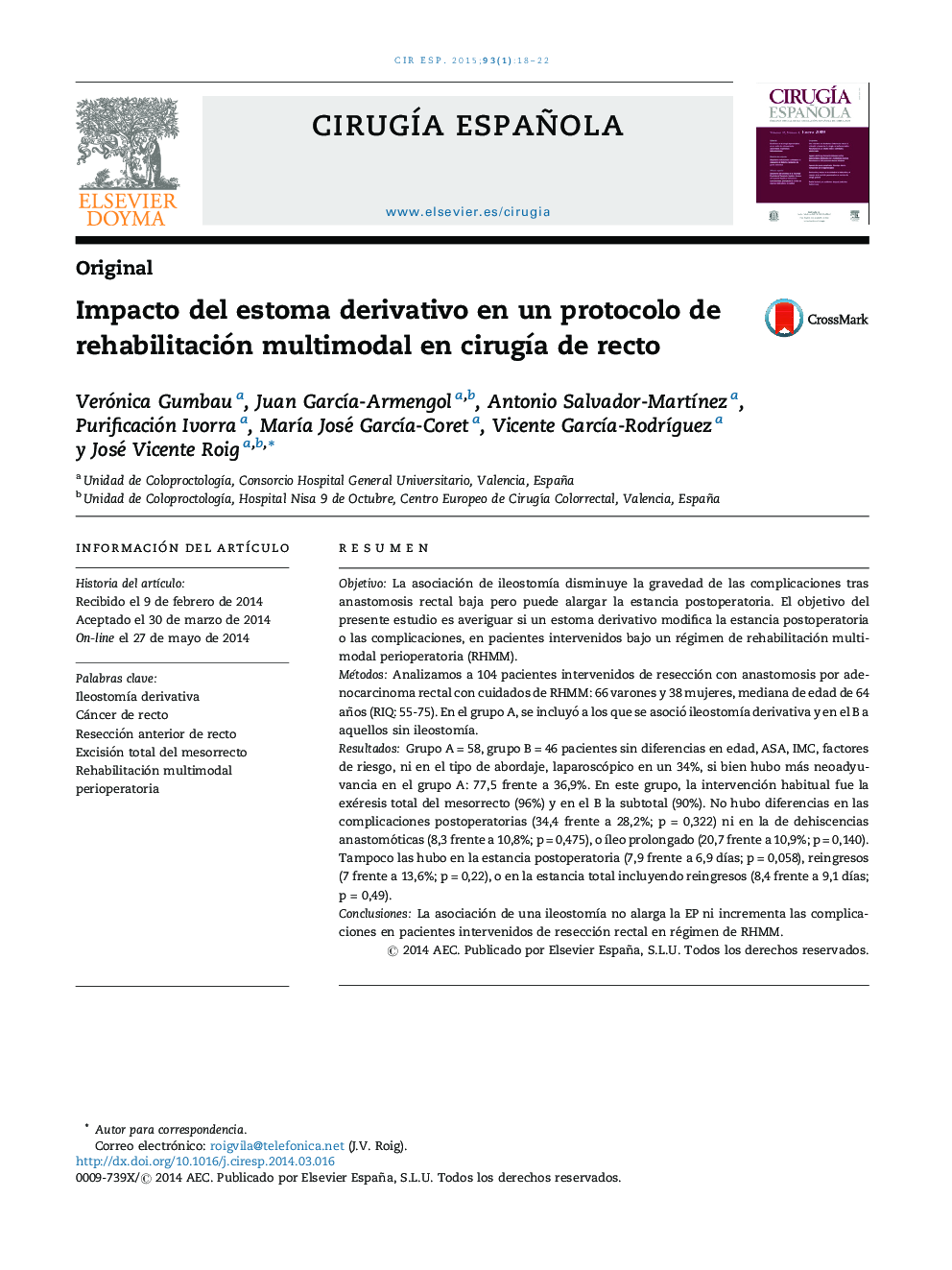| Article ID | Journal | Published Year | Pages | File Type |
|---|---|---|---|---|
| 4252308 | Cirugía Española | 2015 | 5 Pages |
ResumenObjetivoLa asociación de ileostomía disminuye la gravedad de las complicaciones tras anastomosis rectal baja pero puede alargar la estancia postoperatoria. El objetivo del presente estudio es averiguar si un estoma derivativo modifica la estancia postoperatoria o las complicaciones, en pacientes intervenidos bajo un régimen de rehabilitación multimodal perioperatoria (RHMM).MétodosAnalizamos a 104 pacientes intervenidos de resección con anastomosis por adenocarcinoma rectal con cuidados de RHMM: 66 varones y 38 mujeres, mediana de edad de 64 años (RIQ: 55-75). En el grupo A, se incluyó a los que se asoció ileostomía derivativa y en el B a aquellos sin ileostomía.ResultadosGrupo A = 58, grupo B = 46 pacientes sin diferencias en edad, ASA, IMC, factores de riesgo, ni en el tipo de abordaje, laparoscópico en un 34%, si bien hubo más neoadyuvancia en el grupo A: 77,5 frente a 36,9%. En este grupo, la intervención habitual fue la exéresis total del mesorrecto (96%) y en el B la subtotal (90%). No hubo diferencias en las complicaciones postoperatorias (34,4 frente a 28,2%; p = 0,322) ni en la de dehiscencias anastomóticas (8,3 frente a 10,8%; p = 0,475), o íleo prolongado (20,7 frente a 10,9%; p = 0,140). Tampoco las hubo en la estancia postoperatoria (7,9 frente a 6,9 días; p = 0,058), reingresos (7 frente a 13,6%; p = 0,22), o en la estancia total incluyendo reingresos (8,4 frente a 9,1 días; p = 0,49).ConclusionesLa asociación de una ileostomía no alarga la EP ni incrementa las complicaciones en pacientes intervenidos de resección rectal en régimen de RHMM.
PurposeThe association of a loop ileostomy decreases the severity of complications after rectal surgery but can increase the postoperative stay. The aim of this study is to investigate if a diverting ileostomy influences the postoperative outcomes in a series of patients included in a multimodal rehabilitation program (MMRP).MethodsWe analyzed a series of 104 patients that underwent elective surgery with primary anastomosis for rectal adenocarcinoma using a MMRP: 66 men and 38 women, with a median age of 64 (IQR: 55-75) years. Group A included patients with an associated loop ileostomy, and Group B, those without a protective stoma.ResultsGroup A = 58, group B = 46 patients without differences in age, ASA, BMI and other risk factors, nor in the surgical approach (laparoscopic in 34%), although there were more neoadjuvant treatments in group A: 77.5 vs. 36.9%; P=.001. In group A, the most common operation was total mesorectal excision (96%) and in the B, a subtotal mesorectal excision (90%). There were no differences in postoperative complications (Group A 34.4 vs. group B28.2%; P=.322), anastomotic leaks (8.3 vs. 10.8%; P=.475), or postoperative ileus (20.7 vs. 10.9%; P=.140), neither in postoperative stay (7.9 vs. 6.9 days; P= .058, readmissions (7 vs. 13.6%; P= .22), or postoperative stay, including readmissions (8.4 vs. 9.1 days; P= .49).ConclusionsThe association of a loop ileostomy does not extend the length of stay nor increases the rate of complications in patients that underwent a rectal resection with anastomosis included in a MMRP.
